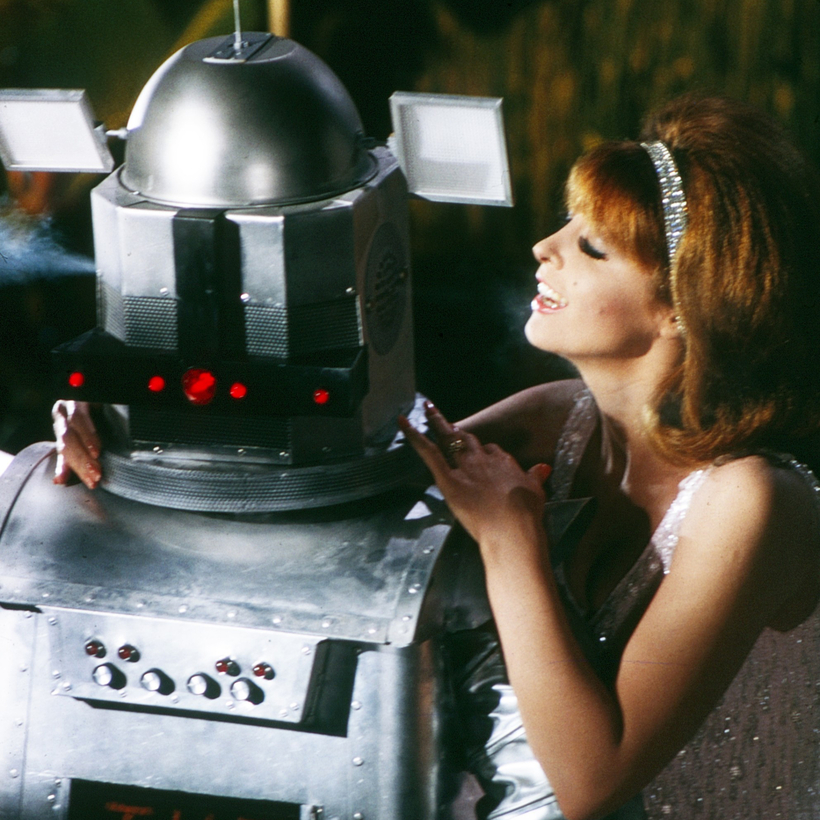Many of us can recall the stomach-spinning embarrassment of accidentally calling our teacher “Mom,” an act guaranteed to earn mockery from peers. But, according to teachers, there’s a new Freudian slip in kindergarten town: “Alexa.”
Most of America uses some kind of digital voice assistant, be it Amazon’s Alexa, Apple’s Siri, or Microsoft’s Cortana, so it’s no surprise that the name would make it into the classroom. Equally unsurprising is that this seems to be a distinctly female phenomenon—male teachers aren’t being mistakenly given the name of any A.I. assistants. That’s because the overwhelming majority of artificial voices are female.
And, in the future, it could be more than just voices.
In April, Kuwait unveiled the world’s first virtual news presenter, generated using artificial intelligence. The presenter is a blonde, blue-eyed woman called Fedha who, according to Abdullah Boftain, the deputy editor of the Kuwait Times, “represents everyone.” “Sophia,” meanwhile—the most advanced humanoid robot, developed by the Hong Kong–based company Hanson Robotics—doesn’t just have a female voice and name but even appears to be wearing makeup.
So why is it that our A.I. seems to be female by default?
According to teachers, there’s a new Freudian slip in kindergarten town: “Alexa.”
One reason for the predominance of female voices is historical. Companies needing a voice are likely to opt for the easiest option, and the database of recordings that already exists skews female. This trend dates back to 1878, when Boston’s Emma Nutt became such a successful telephone operator that within two years the profession became almost exclusively female.

Eventually, people became accustomed to hearing a disembodied female voice rather than a male one. This norm was further enforced during World War II, when a problem presented itself in the R.A.F.: If you have multiple voices talking over one another in a cockpit, how do you ensure that the voice coming through the radio stands out? The obvious answer was to make that important voice something none of the pilots were: female. The sound of a woman’s voice cut through the chatting of the men’s.
It’s not just positive associations that have contributed to the preference for female voices. If you’re over a certain age, your first memory of voiced artificial intelligence is unlikely to be the one of your phone, but, instead, the fictional one seen on-screen with the dreaded HAL from Stanley Kubrick’s 2001: A Space Odyssey. One killer robot led to many more—Westworld’s Gunslinger in 1973, the Terminator in the 1980s, and The Matrix’s Agent Smith in the 1990s all had audiences fearing these male maniacal A.I.’s. Assigning A.I. a female voice may have been a way to stop people from associating them with homicidal computers.
There are also the ideas that people find female voices to be more nurturing—linked to our fetal origins, when we’re calmed down by our mother’s voices—and that the higher pitch of a woman’s voice makes it easier to hear over a loudspeaker in an emergency (although this is disputed and should have little impact on the voice in your speaker telling you the weather forecast or your shopping list).
And then, of course, there’s the lipsticked elephant in the room, that people have historically equated secretarial and assistant positions with “women’s work”—involving similar services to that of our smart devices.
Why is it that our A.I. seems to be female by default?
There are many reasons why it’s “Alexa” and not “Alex,” but just because history has made this the default doesn’t mean we should settle for it. A 2019 study by UNESCO looked at the gender bias in A.I. and found there was a huge “potential of spreading and reinforcing harmful gender stereotypes” that risked “further stigmatizing and marginalizing women on a global scale.” The study was titled “I’d Blush if I Could,” named after Apple’s voice assistant Siri’s response to the comment “Hey Siri, you’re a b****.”
Like traditional helpers—secretaries, nannies, nurses—A.I. assistants have meaningful impacts on our lives. They don’t just remind us of birthdays and play music; whether we like it or not, they’re helping to educate our children, who are growing up used to the robotic voices surrounding them.
While the engineers and designers may not have intended to be sexist in selecting female voices, any system that relies on a historic default is going to have discrimination built into it. Associating docile, dutiful A.I. with women only strengthens sexist ideologies across generations. We tell young girls that they don’t have to be housewives because this isn’t the 50s; that they, too, can join the army because this isn’t the 40s; that they can, but probably shouldn’t, murder a spacecraft full of men, and yet we are relying on a tradition that has been shaped by outdated beliefs from decades past. A.I. is (at least for now) passive, servile, and unquestioningly obedient, things we thankfully no longer insist women be—so we shouldn’t be enforcing this association.
In the last two years, Apple has updated Siri to ask users the gender they would like, a step in the right direction, and yet the majority of voice assistants still present as female by default.
There’s ample evidence that, if the public pushes hard enough, companies will react. In the late 90s, BMW recalled their entire G.P.S. system in Germany following complaints. Except it wasn’t a feminist outcry that prompted the recall, but male drivers refusing to take directions from a female voice. Maybe, this time around, equality, rather than sexism, could be the impetus for change.
Flora Gill is a London-based writer


